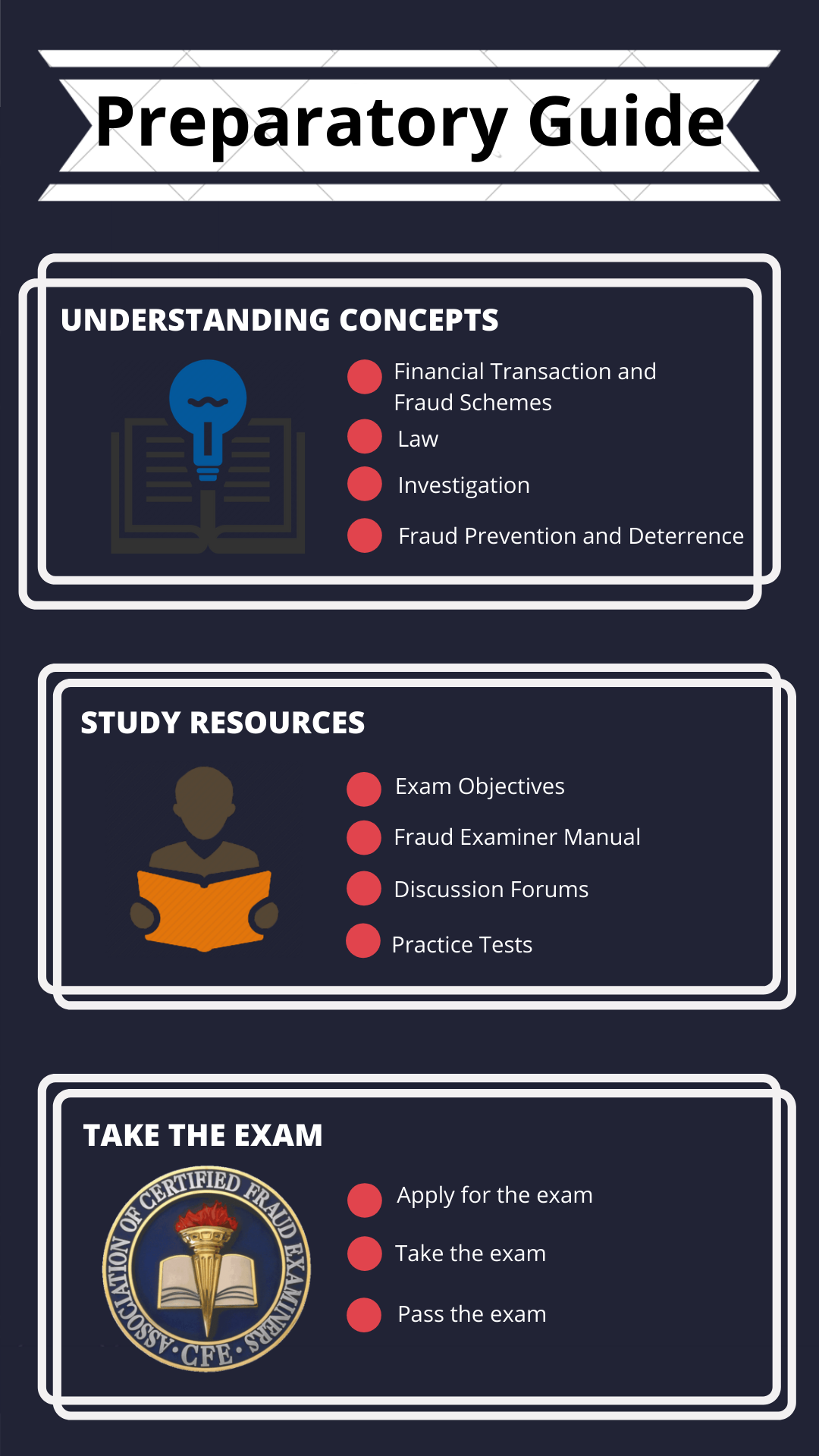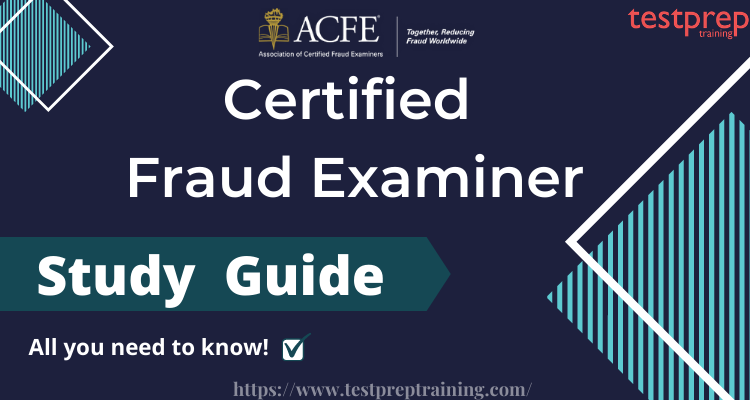The Certified Fraud Examiner (CFE) exam is a professional certification exam offered by the Association of Certified Fraud Examiners (ACFE). The exam tests candidates’ knowledge and skills in the field of fraud examination and prevention, including areas such as financial transactions, fraud schemes, investigation techniques, and legal considerations. It is designed to validate the expertise of fraud examiners and is widely recognized in the industry.
Certified Fraud Examiner Exam Glossary
Here are some key terms related to the Certified Fraud Examiner (CFE) exam:
- Fraud examination: The process of resolving allegations of fraud from inception to disposition.
- Financial transactions: Activities that involve the exchange of money or assets between parties.
- Fraud schemes: Methods used to deceive and defraud individuals or organizations, such as embezzlement, Ponzi schemes, and identity theft.
- Investigation techniques: Strategies for conducting investigations, such as interviewing, surveillance, and computer forensics.
- Legal considerations: Laws and regulations related to fraud, such as the Foreign Corrupt Practices Act and the Sarbanes-Oxley Act.
- Fraud risk management: The process of identifying, assessing, and mitigating fraud risks within an organization.
- Internal controls: Policies and procedures that organizations use to safeguard their assets, ensure accurate financial reporting, and prevent fraud.
- Evidence: Any information that is relevant to a fraud investigation, such as documents, electronic data, and witness statements.
- Forensic accounting: The use of accounting techniques and principles to investigate financial fraud and other financial crimes.
- Ethics: Principles of right and wrong conduct that guide the behavior of fraud examiners and other professionals.
These are just a few of the many terms that may be relevant to the CFE exam.
Certified Fraud Examiner Exam Guide
Here are some official resources for the Certified Fraud Examiner (CFE) exam:
- Association of Certified Fraud Examiners (ACFE) website: The ACFE is the organization that administers the CFE exam. Their website includes information about the exam, study materials, and other resources for aspiring fraud examiners. https://www.acfe.com/
- CFE Exam Prep Course: The ACFE offers an online course that covers the topics on the CFE exam, including fraud prevention and deterrence, financial transactions and fraud schemes, investigation, and legal elements of fraud. https://www.acfe.com/training-center/cfe-exam-prep-course/
- Fraud Magazine: The ACFE’s Fraud Magazine is a publication that provides insights and updates on fraud-related topics, including case studies, interviews with fraud experts, and information about new trends and techniques in fraud prevention and detection. https://www.fraud-magazine.com/
- CFE Exam Study Community: The ACFE offers a study community for CFE exam candidates where they can connect with other aspiring fraud examiners, ask questions, and get study tips and advice from experienced CFEs. https://community.acfe.com/community/certifications/cfe-certification
- CFE Exam Review Course: The ACFE offers an in-person CFE Exam Review Course that provides intensive preparation for the exam and includes expert instruction, study materials, and sample exam questions. https://www.acfe.com/training-center/cfe-exam-review-course/
These resources can be helpful for anyone preparing for the CFE exam.
Certified Fraud Examiner Exam Tips and Tricks
Here are some tips and tricks for the Certified Fraud Examiner (CFE) Exam:
- Study the exam content outline: The CFE exam content outline is provided by the Association of Certified Fraud Examiners (ACFE) and includes the topics covered on the exam. Use this as a guide to structure your studying and ensure you cover all the necessary material.
- Use the ACFE resources: The ACFE offers study materials, including a Fraud Examiners Manual, practice exams, and online review courses. Utilize these resources to prepare for the exam.
- Practice with sample questions: The ACFE provides sample questions on their website to give you an idea of the types of questions that may be on the exam. This will help you become familiar with the format and structure of the exam.
- Understand the concepts: Don’t just memorize definitions and concepts. Make sure you understand how the different concepts are related and how they apply to real-world situations.
- Manage your time: The CFE exam consists of 125 multiple-choice questions and you have four hours to complete the exam. It’s important to manage your time effectively and make sure you don’t spend too much time on any one question.
- Take breaks: It’s important to take breaks during the exam to rest your mind and refocus. Take advantage of the scheduled breaks during the exam to stretch, take a walk, or have a snack.
- Stay calm and focused: Don’t let anxiety or stress get in the way of your success. Stay calm, focused, and confident throughout the exam.
Certified Fraud Examiner (CFE) Exam Study Guide
The Preparations for Certified Fraud Examiner exam is tough given its vast CFE syllabus. It is difficult to comprehend each and every concept. Being consistent with your preparations is the key. Hence follow the step-by-step study guide to ace the exam.

Step 1- Understanding the Exam Objectives
The objectives are the most necessary part for any exam like the Certified Fraud Examiner (CFE) exam. Having utmost clarity about the exam course is indeed essential. These course objectives act as a blueprint for your exam and boost your preparations. Therefore, you must visit the Official Exam Guide to learn more about the exam policies and concepts. The CFE exam sections consists of majorly four domain:
Domain 1 : Financial Transactions and Fraud Schemes
It tests the candidate’s comprehension of the varieties of fraudulent financial activities acquired in accounting records. To claim Financial Transactions & Fraud Schemes, you will be asked to illustrate knowledge of the subsequent concepts: fraud schemes, basic accounting and auditing theory, internal controls to prevent fraud, and additional accounting and auditing matters.
Domain 2: Law
This domain ensures the liberties with the various legal divisions of managing fraud examinations, including rules of evidence, criminal and civil law, rights of the challenged and accuser, and expert witness concerns.
Domain 3: Investigation
Further the Fraud investigation domain involves questions about taking statements, interviewing, collecting information from public records, investigating illicit transactions, and assessing deception and report writing.
Domain 4: Fraud Prevention and Deterrence
Lastly, this domain tests the candidate’s perception of why people engage in fraud and approaches to prevent it. Topics recounted in this section add white-collar crime, crime causation, occupational fraud, fraud risk assessment, fraud prevention, and the ACFE Code of Professional Ethics.
Step 2- Explore Study Resources
There are plenty of learning resources for the Certified Fraud Examiner exam available in the marketplace that provides unique CFE exam study material. Further, you must choose wisely and refer the ones that best suit your preparations. Here are some recommended study resources-
Fraud Examiner Manual
An outstanding reference guide to practice while exercising the Certified Fraud Examiner Exam Preparation Course is the Fraud Examiners Manual. The Fraud Examiners Manual, marked as the reference criterion for the anti-fraud education, is a complete guide fully describing the latest fraud examination systems, techniques, methods, and procedures. Also, you can download from the official page of the ACFE.
Discussion Forums
Joining discussion forums can be a great investment to prepare for the CFE exam. They help the aspirants to foster their preparation process. ACFE affiliates can visit the CFE Exam discussion conference to post problems online and receive feedback from other members and ACFE staff. However, the discussion forums remain in the Members Only section of ACFE.com.
Practice Tests
Practice tests are the most important as well as helping tools to prepare for the exam. They help you find out your core strengths and iron out your weaknesses. Strengthening these weaknesses improvises your preparations and expands your knowledge. Therefore, after preparation, we suggest you to try a hands-on practice test. Moreover, attempting Multiple Practice Tests helps in boosting your confidence. Start using CFE Exam Sample Questions for Practice Now!

Elevate your skills and advance your knowledge by qualifying the Certified Fraud Examiner exam. Start your Preparations Now!


